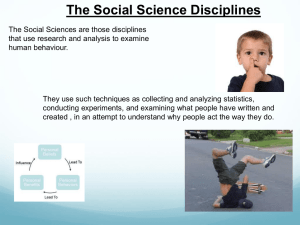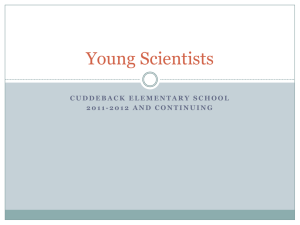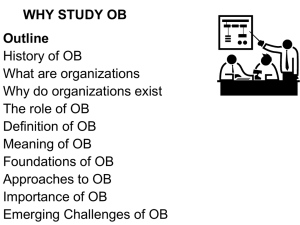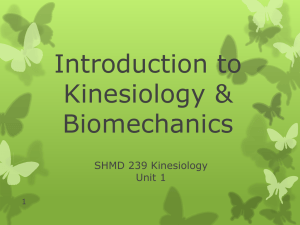RIVERSIDE COMMUNITY COLLEGE DISTRICT
advertisement
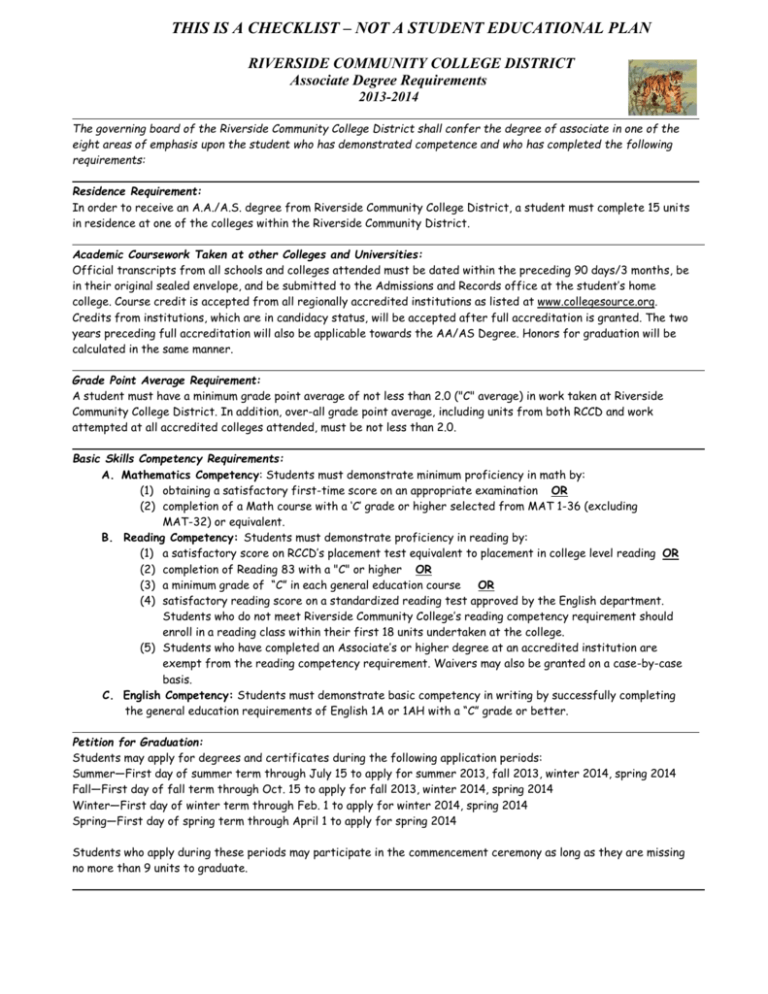
THIS IS A CHECKLIST – NOT A STUDENT EDUCATIONAL PLAN RIVERSIDE COMMUNITY COLLEGE DISTRICT Associate Degree Requirements 2013-2014 The governing board of the Riverside Community College District shall confer the degree of associate in one of the eight areas of emphasis upon the student who has demonstrated competence and who has completed the following requirements: Residence Requirement: In order to receive an A.A./A.S. degree from Riverside Community College District, a student must complete 15 units in residence at one of the colleges within the Riverside Community District. Academic Coursework Taken at other Colleges and Universities: Official transcripts from all schools and colleges attended must be dated within the preceding 90 days/3 months, be in their original sealed envelope, and be submitted to the Admissions and Records office at the student’s home college. Course credit is accepted from all regionally accredited institutions as listed at www.collegesource.org. Credits from institutions, which are in candidacy status, will be accepted after full accreditation is granted. The two years preceding full accreditation will also be applicable towards the AA/AS Degree. Honors for graduation will be calculated in the same manner. Grade Point Average Requirement: A student must have a minimum grade point average of not less than 2.0 ("C" average) in work taken at Riverside Community College District. In addition, over-all grade point average, including units from both RCCD and work attempted at all accredited colleges attended, must be not less than 2.0. Basic Skills Competency Requirements: A. Mathematics Competency: Students must demonstrate minimum proficiency in math by: (1) obtaining a satisfactory first-time score on an appropriate examination OR (2) completion of a Math course with a ‘C’ grade or higher selected from MAT 1-36 (excluding MAT-32) or equivalent. B. Reading Competency: Students must demonstrate proficiency in reading by: (1) a satisfactory score on RCCD’s placement test equivalent to placement in college level reading OR (2) completion of Reading 83 with a "C" or higher OR (3) a minimum grade of “C” in each general education course OR (4) satisfactory reading score on a standardized reading test approved by the English department. Students who do not meet Riverside Community College’s reading competency requirement should enroll in a reading class within their first 18 units undertaken at the college. (5) Students who have completed an Associate’s or higher degree at an accredited institution are exempt from the reading competency requirement. Waivers may also be granted on a case-by-case basis. C. English Competency: Students must demonstrate basic competency in writing by successfully completing the general education requirements of English 1A or 1AH with a “C” grade or better. Petition for Graduation: Students may apply for degrees and certificates during the following application periods: Summer—First day of summer term through July 15 to apply for summer 2013, fall 2013, winter 2014, spring 2014 Fall—First day of fall term through Oct. 15 to apply for fall 2013, winter 2014, spring 2014 Winter—First day of winter term through Feb. 1 to apply for winter 2014, spring 2014 Spring—First day of spring term through April 1 to apply for spring 2014 Students who apply during these periods may participate in the commencement ceremony as long as they are missing no more than 9 units to graduate. Second Degrees: A student may earn more than one degree (AA/AS) from Riverside City College. Students who have met degree requirements in a previous academic year and have not maintained continuous enrollment will be awarded the degree in the term in which the application is submitted, provided all current degree requirements are met. Catalog Rights: Graduation requirements apply to students who ore enrolled for any term (summer, fall, winter, spring) indicated by this catalog ~ summer 2013 through spring 2014. Students who enrolled prior to this current year and who have maintained continuous enrollment have the option of meeting the current requirements or those in effect at the time their continuous enrollment began. Continuous enrollment is defined as attendance of one term during each academic year. Scholastic Honors At Commencement: Honors at commencement will be awarded to students with a cumulative GPA of 3.30 or higher. Their names are listed in the commencement program as receiving the Associate Degree with Distinction (3.30 GPA) or with Great Distinction (3.70 GPA). A gold tassel will be worn by students graduating with honors. Coursework taken during the final spring semester will not be used to calculate honors at commencement. Grade point averages are not rounded up. The cumulative GPA includes coursework taken at Riverside Community College District and at all other accredited institutions. Dean’s List: Each semester, those students who have demonstrated outstanding scholastic achievement by completing at least 12 units of credit-graded work in one semester or 12 units of credit-graded work earned in no more than one academic year (fall, winter and spring, with summer being excluded) with a grade point average of 3.0 or better (completed units will be considered only once for a particular Dean’s List) will be recognized by a letter from the Dean of Instruction. GENERAL EDUCATION REQUIREMENTS General education is designed to introduce students to a breadth of study through which people comprehend the modern world. It reflects the conviction of Riverside Community College District that those who receive their degrees must possess in common certain basic principles, concepts and methodologies both unique to and shared by the various disciplines. Students must complete a minimum of 22 semester units as outlined in the following categories. Special workshop classes (numbered in the 100 series) cannot be used to fulfill general education requirements. The following basic skills courses are non-degree applicable: English 60AB, 60A1, 60A2, 60A3, 60A4, 80, 90B; English as a Second Language 51, 52, 53, 71, 72, 90 A-K, 91, 92, 95; Mathematics 37, 52, 63, 64, 65, 90A-F, 98; and Reading 81, 82, 83, 86, 87, 95. The following courses are also non-degree applicable: Communication Studies 51; English 85; English As A Second Language 65; Nursing (Continuing Education) 52A, 52B, 52C, 62A, 62B, 62C, 81; Registered Nursing 11A, 11B, 11C, 12A, 12B, 12C. GENERAL EDUCATION A. Natural Sciences (3 units) ___Anatomy & Physiology 2A,2B,10 ___Anthropology 1 ___Astronomy 1A,1B ___Biology 1,1H,2A,2B,3,5,6,7,8,9,10,11,12,14,15,17,30,31A, ___31B,34,36 ___Chemistry 1A or 1AH,1B or 1BH,2A,2B,3,10,12A,12B,17 ___Geography 1,1/1L,1H,1H/1L,5 ___Geology 1,1/1L,1B,2,3,30A,30B,31,32 ___Microbiology 1 ___Oceanography 1,1/1L ___Physical Science 1,5 ___Physics 2A,2B,4A,4B,4C,4D,10,11 ___Psychology 2 (Waivers granted for COS 60C and ELE 21 or 22) B. Social and Behavioral Sciences (6 units) 1. American Institutions (3 units) ___History 6 or 6H,7 or 7H,8,9,15,26,28,29,30,31,34,53 or ___Political Science 1 or 1H,5 2. _Social and Behavioral Sciences (3 units) ___Anthropology 2,3,4,5,6,7,8,10,21 ___Economics 4,5,6,7 or 7H,8 ___Geography 2,3,4,6 ___History 1,2,4,5,11,12,14,19,21,22,23,25,35,40,53 ___Human Services 4,5,6,7,8,13,14,16,17,18,19 ___Military Science 1,2 ___Political Science 2 or 2H,3,4 or 4H,6,7ABCD,8,10ABCD, __ 11,12,13,14 ___Psychology 1,8,9,33,35 ___Sociology 1,1H,2,3,10,12,15,17,20,22,23,25,45,50 C. Humanities (3 units) ___American Sign Language 1 ___Architecture 36 ___Art (any course) ___Communication Studies 7 ___Dance 3,4,5,6,7,8,9,12,13 ___English 1B or 1BH,6,7,8,9,10,11,12,13,14,15,16,17,18,20, 23,25,26,30,34,35,38,39,40,41,44,45,47,48,49 ___ Film, Television and Video (any course) ___Foreign Language (any course) ___History 1,2,4,5 ___Humanities 4 or 4H,5 or 5H,8,9,10 or 10H,11,16,18, ___20ABC,23,35 ___Music (any course) ___Philosophy 10 or 10H,12,13,14,19,20,21,22,33,35 ___Photography 8 ___Theater Arts (any course) D. Language and Rationality (10 units) 1. English Composition (4 units) ___English 1A or 1AH (“C” grade or better) 2. _Communication & Analytical Thinking (6-8 units) Take one course from two of the following: ___Communication Studies 1 or 1H, 9 or 9H ___Computer Information Systems 1A-30 ___English 1B or 1BH ___Mathematics 1-36 ___Philosophy 11,Philosophy/Math 32 ADDITIONAL REQUIREMENTS A. Health Education (3 units) __ Health Science 1 (or completion of the DEH, EMS, PA, VN, or RN program) B. Self Development (2 or 3 units) 1. KIN (2 activities courses): ___KIN 6,29,42,47; Dance 3,5; any KIN/DAN activity class; MUS 45,46,47,48,59,60,61 OR 2. Fitness and Wellness (3 units) ___KIN 4,30,35,36 NOTE: Students are exempt from the Self Development requirement when they complete the Cosmetology, Registered or Vocational Nursing programs, Basic Peace Officer Training Academy, Firefighting Academy, EMS or Physician Assistant program C. Unit Requirement A minimum of 60 units of college work, of which 18 semester units are in one of the eight areas of emphasis listed below. Associate of Arts: 1. ADMIN. & INFORMATION SYSTEMS (AA494) Administration/Information Systems entails the study of theories, procedures and practices and the acquisition of skills necessary to function productively in an administrative work environment. Career paths chosen by students pursuing undergraduate studies in Administration/Information Systems typically include managerial positions in business and the public sector, administrative support positions, customer service, sales, accounting/bookkeeping and public relations. Students completing associate degrees in Administration/Information Systems may obtain entry-level positions in the above career fields or may choose to transfer to a four-year college or university to pursue a bachelor’s degree in business, accounting, public administration, management information systems or related fields. The student must successfully complete 18 units of study with a Grade of ‘C’ or better or a ‘P’ if taken on a ‘passno pass’ basis. INCLUDED DISCIPLINES and COURSES: Required Courses (9 units, selected from the following): Accounting (ACC) 1A; Business (BUS) 10,**18A; Computer Information Systems (CIS) 1A; Economics (ECO) 7 or 7H,8; Political Science (POL) 8 Elective Courses (9 additional units, selected from): Accounting (ACC) 1A,1B,38; Business (BUS) 10,**18A, **18B,20,22,80; Communication Studies (COM) 1,1H,6,9,9H, 12,13; Computer Information Systems (CIS) 1A,1B,2,3, 5; Computer Applications and Office Technology (CAT) 3,31; Economics (ECO) 4,6,7 or 7H,8; Library (LIB) 1; Management (MAG) 44; Marketing (MKT) 20; Political Science (POL) 6,8 A course may only be counted once. **Credit limitation: UC will accept a maximum of one course for transfer. 2. AMERICAN STUDIES (AA492) American Studies examines the American experience from the colonial period of the United States to the present. Students will study, interpret, and evaluate events, cultural Products, and trends in American economic, political, and social history as well as in American architecture, art, literature, music, religion, and they will evaluate questions to which there are multiple plausible interpretations. Students pursuing the program in American Studies will enhance their skills in critical thinking and both oral and written communication. The American Studies program prepares students for further study in the English/literature, history, political science, and sociology At a four-year baccalaureate institution and provides an Excellent foundation for students interested in administration, communications, law, public service and teaching. The student must successfully complete 18 units of study Across a maximum of three disciplines including at least one two-semester sequence with a grade of “C” or better or a “P” if the course is taken on a “pass-no pass” basis. Take one of these two-semester sequences (6 units): ENG 14 and 15 HIS 6/6H and 7/7H, 11 and 12, 14 and 15, 28 and 29, 30 And 31 Elective Courses (12 additional units chosen from): AML 22; ECO 7,7H; ENG 14,15,18,20,25,47; FTV 12; HIS 6/6H,7/7H,11,12,14,15,26,28,29,30,31,34; HUM 9,11,16; MIL 1,2; MUS 25,26,89; PHI 19; POL 1/1H,5,12,13; SOC 2,3,15,22 3. COMM., MEDIA & LANGUAGES (AA495) Communications is the study of how humans construct meanings through interactions. Courses in this area may focus on the knowledge and skills needed to communicate effectively in oral, written, or visual forms; on the study of language and culture; and/or on a critical understanding of the structures and patterns of different kinds of communication as they affect individuals and society. Studies in Communication, Media and Languages is designed for students interested in pursuing further studies in English, Journalism, Mass Communication, Media Studies, Speech Communication, and World Languages at four-year colleges and universities. It may be useful for students interested in pursuing careers in communications, graphic design, journalism, law, marketing, public relations, radio and television, translating, and writing, among others. The student must successfully complete 18 units of study across 3 disciplines; 9 units must be taken in a single discipline with a grade of ‘C’ or better or a ‘P’ if taken on a ‘pass-no pass’ basis. INCLUDED DISCIPLINES AND COURSES: Anthropology (ANT) 8; Applied Digital Media (ADM) 1; Communication Studies (COM) 1,1H,2,3,5,6,7,9,9H,11,12, 13,19; English (ENG) 1A,1AH,1B,1BH,6,7,8,9,10,11,12,13, 14,15,16,23,25,26,30,35,38,39,40,41,44,45,48,49; Film Studies 1,2,3,4,5,6,7,8; Film, Television and Video (FTV) 12,44,45,65; Journalism (JOU) 1,2,7,12,20A20B,20C,20D,52A,52B,52C,52D; Library (LIB) 1; Photography (PHO) 12; World Languages: Arabic (ARA) 1,2,3,8,11; American Sign Language (AML) 1,2,3,4,5, 10,11, 12,13,14,20,21,22; Chinese (CHI) 1,2,11; French (FRE) 1,2,3, 4,8,11; German (GER) 1,2,3,11; Greek (GRK) 1,2; Italian (ITA) 1,2,3,11; Japanese (JPN) 1,2,3,4,11; Korean (KOR) 1,2,11; Latin (LAT) 1,2; Portuguese (POR) 1,2; Russian (RUS) 1,2,3,11; Spanish 1,1A,1B,1H,2,2H, 3,3N,4,8,11,12,13,*51,*52,*53 4. FINE & APPLIED ARTS (AA496) The associate degree in Fine & Applied Arts offers a rich variety of courses to acquaint students with the creation of and performance in the arts from a global perspective. The courses in this area examine the nature of the fine and applied arts through analysis, synthesis, composition, performance and technical development. Students will develop techniques appropriate to the art form, engage in the production and performance of the arts, examine aesthetic valuing, and participate in creative expressing. This area of emphasis is designed for students interested in exploring a variety of art forms including digital media, creative writing, dance, film, graphic design, music, photography, communication studies, television, theatre, video and the arts. The student must successfully complete 18 units of study across a maximum of 3 disciplines with 9 units from a single discipline and with a grades of ‘C’ or better or a ‘P’ if taken on a ‘pass-no pass’ basis. INCLUDED DISCIPLINES AND COURSES: Applied Digital Media (ADM): 1,30,64,67,68,70,71,72, 74, 76, 77A,77B,80,88,89,200; Art (ART) 1,2,2H,5, 6,6H,7,8,9,10,12,15,16,17,18,20,21,22,23,24,25,26, 27,28,30,34,35,36,38,39,40,41,42,43,44A,44B,44C,45, 46,47,48,49,200; Communication Studies (COM) 1,1H,2, 3,7,11,19; Dance (DAN): 3,4,5,6,7,8,9,D9,D10,D11,D12, D13,D14,D15,D16,D17,D18,D19,D20,D21, D22,D23,D24, D25,D30,D31,D32,D33,D34,D37,D38,D39,D43,D44,D45, D46, D47,D48,D49,D50,D51,D60; English (ENG): 11,12,13, 17,38,39,49; Film, Television, and Video (FTV): 38,41,42,43, 44,45,46,48,51,52,53,60,63,64,65,66,67,68,69,70,71,72; Music (MUS): 3,4,5,6,8A,8B,9,10,19,22,23,25,26,27,28,29, 30,31,32A,32B,32C,32D,33,35,36,37,38,39,41,42,43,44,48, 49,50,51,52,53,54,55,57,58,61,65,68,69,70,73,77,81,82,83, 84,87,89,92,93,94,P12,P36,P44,P84; Photography (PHO): 8,9,10,17,20,200; Theatre (THE): 2,3,4,5,6,25,26,29,30,32, 33,34,35,36,37,38,39,41,44,46,48,49,54 5. HUMANITIES, PHILOSOPHY, & ARTS (AA497) Humanities, Philosophy, and Arts examines human values and experience within a wide range of cultures, across the globe, and over the course of history. Students will study, interpret, and evaluate classic works in architecture, art, literature, music, philosophy, religion, rhetoric and the theater, and they will encounter questions to which there are multiple plausible answers. The study of language, philosophy, and rhetoric provides crucial tools for understanding and interpreting human knowledge and experience. Students pursuing the program in the Humanities, Philosophy, and Arts will enhance their skills in critical thinking and both oral and written communication. The Humanities, Philosophy, and Arts program prepares students for further study in the arts, history, humanities, literature, philosophy, speech communication and/or world languages at a four-year baccalaureate institution and provides an excellent foundation for students interested in administration, communications, law, public service, and teaching. The student must successfully complete 18 units of study across 3 disciplines; 9 units must be taken in a single discipline. Up to 3 units may be taken in a studio course. The 18 units must be completed with a grade of ‘C’ or better or a ‘P’ if taken on a ‘pass-no pass’ basis. INCLUDED DISCIPLINES AND COURSES: Anthropology (ANT): 7,8; Architecture (ARE): 36; Art (ART): 1,2,2H,5,6,6H,7,8,9,10,12; Communication Studies (COM): 1,1H,2,3,5,7,9,9H,11,12,13,19; Dance (DAN): 3,6; English (ENG):1B,1BH,6,7,8,9,10,14,15,16,18,23,25,26,30, 35,40,41,44,45,48; Film Studies 1,2,3,4,5,6,7,8; Film, Television & Video (FTV): 12,65; History (HIS): 1,2,4,5,6,6H,7,7H,8, 9,14,15,21,22,25,26,28,29,30,31,34,35; Humanities (HUM): 4,4H,5,5H,8,9,10,10H,11,16,18,23,35; Library (LIB): 1; Music (MUS): 19,20,21,22,25,26,89,93; Philosophy (PHI): 10,10H,12,13,14,19,20,21,22,32,33,35; Political Science (POL): 11; Theatre (THE): 3,29; World Language, including: Arabic (ARA): 1,2,3,8,11; American Sign Language (AML): 1,2,3,4,5,10,11 12,13,14,20,21,22,23; Chinese (CHI): 1,2,11; French (FRE): 1,2,3,4,8,11; German (GER): 1,2,3,11; Greek (GRK): 1,2; Italian (ITA): 1,2,3,11; Japanese (JPN): 1,2,3,4,11; Korean (KOR): 1,2,11; Latin (LAT): 1,2; Portuguese(POR): 1,2; Russian (RUS): 1,2,3,11; Spanish (SPA): 1,1A,1B,1H,2,2H,3, 3N,4,8,11,12,13,*51,*52,*53. Applicable studio courses include (Note that some classes are less than three units.):Art (ART): 15,16,17,18,20,21,22,23,24,25,26, 27,28,30,34,35,36,38,39,40,41,42,43,44,45,46,47,48, 49,200; Dance (DAN): 7,8,9,D9,D10-D25,D30,D32,D37, D38,D39,D43,D44,D45,D46,D47,D48,D49,D51,D60-67; English (ENG) 11,12,17,38; Music (MUS): 38,39,P12; Theatre (THE) 2,4,5,6,25,26,30,32,33,34,35,36,37, 38,41,50,51,52,54 6. KINESIOLOGY, HEALTH & WELLNESS (AA498) These courses emphasize the principles for the growth and development of a healthy lifestyle. Students will acquire the knowledge and understanding of these principles to integrate and promote personal, individual or group behavior conducive to the maintenance or restoration of mental and physical wellness. This emphasis will provide students with an understanding of physical skills and their development related to physical activity, exercise and sport. Students will also acquire knowledge of decision making and problem solving strategies for self-management as it pertains to leading a productive and healthful lifestyle. This area of emphasis is designed for students interested in making positive life choices and in the study of health, nutrition, and wellness; physical education/kinesiology; athletic training; sport performance, officiating and coaching; career planning and life management; and the biology, anatomy and physiology of the human body. Students who work closely with their counselor may use this emphasis area to prepare to transfer to four year institutions in majors such as Health Science, Nutrition, Physical Education/Kinesiology, Exercise Science, and Recreation and Leisure Studies. Some careers such as Athletic Trainer, Physical Therapist, Exercise Physiologist, Sport Nutritionist, and Physical Education and Health Education teachers may require education beyond the Bachelor’s Degree. The student must successfully complete 18 units of study with a grade of ‘C’ or better or a ‘P’ if taken on a ‘passno pass’ basis. INCLUDED DISCIPLINES AND COURSES: Required Courses (take 3 units in each of the disciplines): Health Science (HES): 1 Kinesiology/academic courses (KIN): 4,6,8,10,12,16,17,18, 24,25,26,27,28,29,30,33,34,35,36,38,47 Elective Courses (12 additional units, selected from the following): Anatomy and Physiology (AMY): 2A,2B, 10; Biology (BIO): 17, 30,34; Early Childhood Education (EAR) 26; Guidance (GUI): 45,46,47,48; Kinesiology/academic courses (PHP): 4,6,8,10, 12,16,17,18,24,25,26,27,28,29,30,33,34,35,36,38,47 Kinesiology/activity courses (PHP): A03,A04,A07,A09, A10, A11,A12,A13, A20,A21,A28,A29,A30,A31,A40,A41, A43,A44, A46,A47, A54,A55,A57,A62A,A64,A67,A68,A69, A74,A75, A77,A80,A81,A82,A83,A86,A87,A88,A89,A90,A92; Kinesiology/varsity courses (PHP):V01,V02,V04,V05,V06,V07, V08,V09,V10,V11,V12,V14,V18,V19,V20,V21,V22,V23,V24,V25, V26,V33,V34,V50,V51,V52,V53,V60,V61,V70,V78,V94,V95 A course may only be counted once except for KIN activity or varsity courses. 7. SOCIAL & BEHAVIORAL STUDIES (AA499) Social and Behavioral Studies is a collection of academic disciplines dedicated to the scholarly study of the human experience. As a comprehensive and multidisciplinary area of study, Social and Behavioral Studies will afford the student an opportunity to explore and examine the nature and multitude of interactive relationships amongst and between individuals and between the individual and their social environment; ranging from the development of the individual, to the nuances of interpersonal interaction, to the dynamic structures of national and global communities. Ultimately, the student of Social and Behavioral Studies will gain a heightened awareness of the nature of their individuality, attain a greater understanding and appreciation of the complexities and diversity of the world in which they live and become better equipped to succeed in an increasingly diverse and complex society. Career paths typically chosen by undergraduate students emphasizing Social and Behavioral Studies include: Law Enforcement, Law, Human Relations, Human Resources, Social Work, Professional Childcare and Public Service Agencies, Teaching across the educational and academic spectrum, Consultation in the public and private sectors, Governmental Advisors, Speechwriting, and both domestic and international business professions. The student must successfully complete 18 units of study across a minimum of 3 disciplines listed below with a grade of ‘C’ or better or a ‘P’ if taken on a ‘pass-no pass’ basis. INCLUDED DISCIPLINES AND COURSES: Administration of Justice/Justice Studies (ADJ): 1,2,3,4,5,8,9,13,14,15,30; Administration of Justice/Law Enforcement (ADJ): 6,16,18,20,21,22,23,25; Anthropology (ANT): 1,2,3,4,5,6,7,8,10,21; Communication Studies (COM): 1,1H,2,3,5,6,9,9H,12,13; Early Childhood Studies (EAR): 19,20,25,28,33,40,42,43,47; Economics (ECO) 4,5,6,7,7H,8; Geography (GEG): 2,3,4,6; Guidance (GUI) 47; History (HIS) 1,2,4,5,21,22,35; Human Services (HMS) 4,5,6,7,8, 13,14, 16,18,19; Library Science (LIB): 1; Political Science (POL): 1,1H,2,2H,3,4,4H,5,6,7ABCD,8,10ABCD,11,12,13,14; Psychology (PSY): 1,2,8,9,33,35; Sociology (SOC): 1,1H,2,3,10,12, 15,20,22,25,45 2B,3,5,6,7,8,9,10,11,12,17,30,34,36; Chemistry (CHE): 1A, 1AH,1B,1BH,2A,2B,3,10,12A,12B,17; Computer Information Systems (CIS): 5,17A,17B,17C,18A,18B,18C; Electronics (ELE): 21,22,23,24,25; Engineering (ENE): 1A,1B,10,21,22,23, 26,27,28,30,31,35; Geography (GEG): 1,1L,1H,5; Geology (GEO): 1,1L,1B,3; Geographic Information Systems (GIS): 1; Health Science (HES): 1; Mathematics (MAT): 1A,1B,1C,2,3, 4,5,10,11,12,12H,25,32,36; Microbiology (MIC): 1; Oceanography (OCE): 1,1L; Physical Science (PHS): 1,5; Physics (PHY): 2A,2B,4A,4B,4C,4D,10,11; Psychology (PSY): 2 A course may only be counted once Associate of Science: 8. CAREER AND TECHNICAL PROGRAMS The Associate in Science degree in career and technical programs will be awarded upon completion of the requirements for the certificate or program of 18 units or more plus completion of the graduation requirements as described in the catalog, as well as electives, totaling 60 units of college work as required for the associate degree. Specific requirements for each program are listed in pages 63-109 of the catalog. 9. MATH AND SCIENCE (AS493) These courses emphasize the natural sciences, which examine the physical universe, its life forms, and its natural phenomena. Courses in Math emphasize mathematical, analytical, and reasoning skills beyond the level of intermediate algebra. Courses in science emphasize an understanding of the process of science and the scientific method. All courses emphasize the use mathematics and science as investigative tools, the role of mathematics and science as part of human civilization and society, and the inherent value of both inductive and deductive reasoning as part of the human experience. This area of emphasis is designed for general education students, as well as students interested in mathematics or science as a possible career path, with career opportunities included in mathematics, chemistry, physics, biology, ecological/earth sciences, geology, engineering, computer science, electronics, oceanography, microbiology, kinesiology/exercise science and the medial sciences. The student must successfully complete 18 units of study with a grade of ‘C’ or better or a ‘P’ if taken on a ‘pass-no pass’ basis. Required Courses (take one course in each of the 3 categories, including one course with a lab): Mathematics (MAT): 1A,4,5,10,11,12,12H,25 Physical Sciences: Astronomy (AST) 1A, Chemistry (CHE) 1A,1AH, 2A,10, Geography (GEG) 1,1H,1L, Geology (GEO) 1,1L,3, Oceanography (OCE) 1, Physical Science (PHS) 1, Physics (PHY) 2A,4A Life Sciences: Anatomy & Physiology (AMY) 2A, Biology (BIO) 1,1H,2A,5,7,8,9,11,34,36, Microbiology (MIC) 1 Elective Courses (The remaining units may be taken from any of the following courses: Anatomy and Physiology (AMY): 2A,2B,10; Anthropology (ANT) 1; Astronomy (AST)): 1A,1B; Biology (BIO) 1,1H,2A, NOTE: All courses in regular font are transferable to CSU with the courses in bold being transferable to both CSU and UC. Courses designated with a (*) are not transferable. AssocDeg2013.doc Haugh
